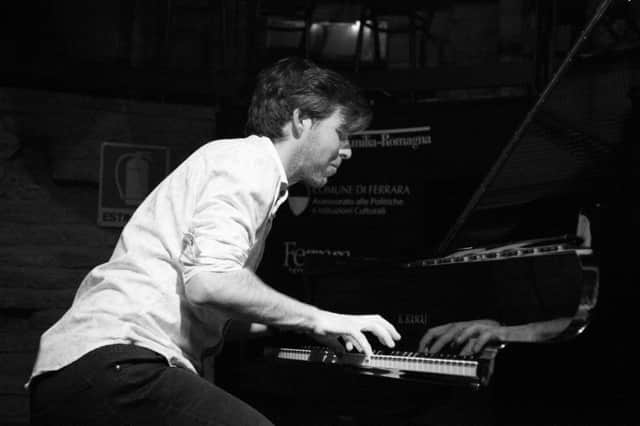Jim Gilchrist previews the East Neuk Festival


In a way, to pursue his simile, opening this most inventive of festivals with what should prove to be a scintillating musical exchange between pianist, double bassist Yuri Goloubev and drummer Asaf Sirkis sits well with the more discursive aspects of a music festival which also includes a “Littoral” programme of literary events
“The privileged thing about being a musician,” says Simcock, “is being able to do a concert with two of my closest friends, just like three people meeting and having a conversation. I think people sometimes forget that and get a bit scared by the word ‘jazz’ and think it’s going to be something really difficult to get into.
Advertisement
Hide Ad“I’m really keen to make music that communicates to and connects with the audience. That doesn’t mean selling out; it’s just about playing the music you want to play in a way which lets people follow the storyline.”
At 34, the Welsh-born, London-based pianist’s own storyline has seen him scoop numerous awards and plaudits since he emerged from his schooling at Manchester’s Chetham’s School of Music and the Royal Academy of Music in London, to become the first BBC New Generation Artist to come from a jazz background. He was hailed as “an original, a creative genius” by no less than one of his major jazz influences, the US pianist and composer Chick Corea.
Simcock’s performances might see him delivering delicately nuanced solo chamber jazz or playing with a string orchestra (last year with the BBC Scottish Symphony Orchestra or, on his recent Instrumation album, with the City of London Sinfonia) or in the formidable Anglo-American “superband” The Impossible Gentlemen. An eclectic litany of other collaborations over the past decade embraces such internationally revered names as Dave Holland, Lee Konitz, Bobby McFerrin and Bill Bruford’s Earthworks.
For his first visit to the East Neuk, however, he’ll take the stage of the converted church that is Crail Community Hall in the company of two long-time collaborators, the Russian double bassist Goloubev and Israeli-born drummer Sirkis. The trio format, with its emphasis on communication, is one he particularly enjoys – although, he adds, “to be honest, I enjoy every musical situation, although I do try and make sure there is a constant thread of me somewhere in the middle of it all.
“But trio playing is fantastic, and because Yuri and Asaf and myself have played for so long now, we have that kind of familiarity and, as I say, there’s a real analogy with a conversation.”
As he writes in the sleeve notes to one of his albums, while when younger he might have felt technical mastery of one’s instrument was paramount, at the end of the day, “it’s the working off ideas and music-making of others that is the real thrill, excitement and challenge in this genre of improvised music.”
Advertisement
Hide AdWhatever these places might be, with Simcock and company they will inevitably be engagingly musical, as demonstrated on albums like Blues Vignette or the more recent Reverie at Schloss Elmau, his keyboard work ranging from impressionist nocturne or hymn-like meditation on a Grieg piano concerto to the bluesy glad-handing of On Broadway or Black Coffee. Take the title track of Blues Vignette, for example, as he shifts between dreamy chiming to exuberant riffing, Goloubev’s arco bass sighing like a cello before stalking into more conventional jazz pizzicato.
Through it all runs a consistent lyricism and an emphasis on leaving scope for improvisation, even in through-composed pieces. “For me it’s trying to make these distinctions a bit more seamless, so it shouldn’t matter whether the music is composed or improvised, just the shape and story of the music having a satisfactory feel to it.”
Advertisement
Hide AdThere are very different challenges, he adds, in composing your own music and playing someone else’s material. “It’s nice to try and link with the audience by playing something they will recognise, but adapting it to make it your own.” There’s a lyricism to his playing which, he says, reflects the fact that for leisure listening, “I probably don’t listen to jazz as much as things like Earth, Wind and Fire, Michael Jackson or Steely Dan – things that are strongly driven by simple melodies.”
There’s further jazz, but of a very different style the following day, as the fiery east European gypsy jazz of the Budapest Café Orchestra returns to the festival by popular request. Jazz, of course, is just one strand of the East Neuk Festival, the backbone of which continues to be classical, with performances in such atmospheric venues as the ancient kirks of Crail, St Monans and Dunino, or in Cambo House and its surrounding grounds.
This year’s guests include violinists Alexander Sitkovetsky and Hugo Ticciati and viola player Maxim Rysanov, as well as Scots soprano Mhairi Lawson, the Dunedin Consort and regular guests the Scottish Chamber Orchestra.
This year’s festival theme is “Time Travellers”, with music spanning three centuries and featuring a 300-year-old Stradivarius violin lent to the festival.
Repertoire will range from Vivaldi to Britten, with Bach “at the heart of things”, and one notable event sees the esteemed Highland fiddler Duncan Chisholm joining cellist Philip Higham in St Monans kirk for a programme mingling Bach’s cello suites with tunes from the roughly contemporaneous Patrick MacDonald Collection.
Things align themselves firmly back in the 21st century in the festival finale, the promenade premiere of From a Distance, commissioned from Pulitzer Prize-winning American composer John Luther Adams, by 32 horn players in the grounds of Cambo House.
Advertisement
Hide AdMeanwhile the festival’s nicely punning “Littoral” strand explores nature writing, with readings from authors such as Tom Pow and James Robertson, while Helen Macdonald discusses her award-winning memoir H is for Hawk – which brings us back to conversations, musical or otherwise.
For further information, see www.eastneukfestival.com